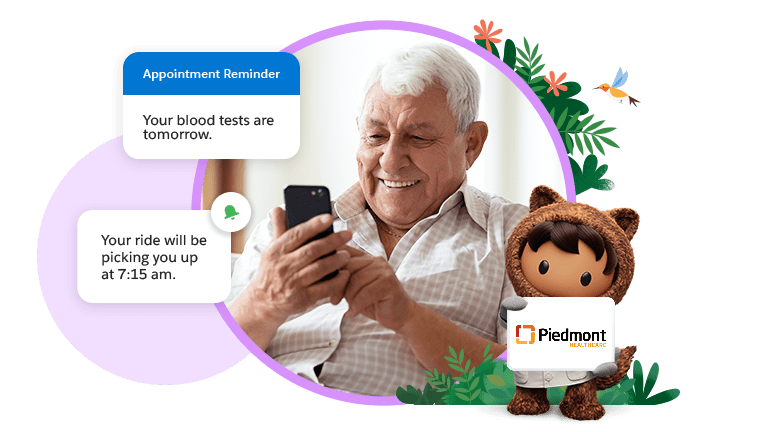Chapter 2: Personalize every patient interaction

Chapter 1: Help care providers turn information into action
Patients managing health issues often feel vulnerable. Personalized attention and easy access to care are of the utmost importance.
When clinicians and support staff have the information they need at their fingertips, they can deliver the best care possible, which builds relationships, deepens trust, and translates to better health outcomes. From agents handling inquiries to doctors discussing care plans, everyone has full visibility into the situation to personalize the patient experience. Here’s how:
Tailor patient communications
Automate patient journeys
Empower every patient
Use data to improve care
Identify social determinants of health to help patients beyond medical care. For example, Piedmont Healthcare, which serves more than 2 million patients across Georgia, uses Health Cloud to gain a complete view of each patient. That includes information about their living conditions which lets in-home care providers know which patients might need healthy meals or transportation to their appointments. Addressing these issues improves care outcomes and reduces rates of hospital readmissions.
Piedmont also uses data to encourage patients to adhere to their care plans between appointments. Health Cloud delivers personalized appointment reminders and prescription refill notices through an automated process that securely accesses electronic health records.
When the pandemic hit, they adapted the system to handle an influx in patient calls. They trained 80 new triage nurses and call center agents on new COVID-related call scripts and flows and used dashboards to monitor symptoms and outcomes. Whenever information or guidance changed, they updated the system and pushed out communications to internal teams and patients so everyone had the latest visitor policies or social distancing guidelines.

Report
The Customer Experience in Healthcare: New Journeys Ahead

Guide
Scale Care Anywhere with Complete Digital Engagement Solutions

Guide
Personalized Healthcare: Moments That Matter
More resources

Technology Playbook for Providers

How to Improve the Experience With Unified Data






